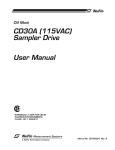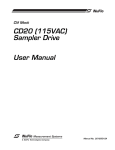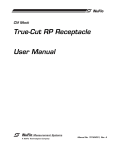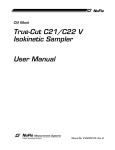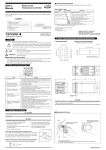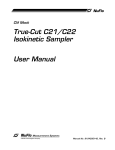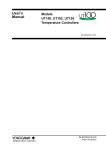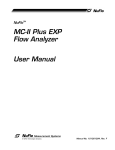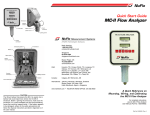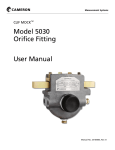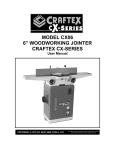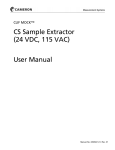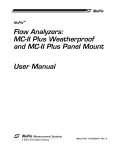Download Clif Mock
Transcript
Clif Mock CD20A (115VAC) Sampler Drive User Manual Manual No. 20165014A © 2004 NuFlo Technologies, Inc. All information contained in this publication is confidential and proprietary property of NuFlo Technologies, Inc. Any reproduction or use of these instructions, drawings, or photographs without the express written permission of an officer of NuFlo Technologies, Inc. is forbidden. All Rights Reserved. Printed in the United States of America. Manual No. 20165014A April 2004 Table of Contents Description .................................................................................................................... 1 Pulse Input Scaling ...................................................................................................... 1 Repeat Time Scaling ................................................................................................... 1 Installation and Wiring.................................................................................................. 2 Start-Up Procedure ....................................................................................................... 3 Pre-Test Procedure ..................................................................................................... 3 Repeat Mode Check-Out ............................................................................................. 3 External Input Pulse Mode Check-Out ........................................................................ 4 Sample Probe and CD20A Check-Out ........................................................................ 4 Motor Control Operation............................................................................................... 4 Control Card Functions................................................................................................ 4 Power Board Functions ............................................................................................... 5 Troubleshooting ............................................................................................................ 6 Sampler Drive Schematic ............................................................................................. 8 Bill of Materials.............................................................................................................. 9 April 2004 i ii April 2004 Description The CD20A Control and Drive Assembly is engineered specifically for use with the True-Cut C-Series sample probes. It comprises the following components: • a motor speed control that provides both pulse input (flow-proportional) and repeat (timeproportional) control of the sample probe. When a “start” pulse is received at the CD20A control card input, the probe is rotated 180 degrees to capture and discharge a single 1.5-ml isokinetic sample. On a horizontal line, the probe is stopped in the closed position, while on a vertical line, the probe is stopped in the open position. • a 9VDC gear motor with a gear ratio of 150:1 • a cam with two high points located opposite each other mounted on the gear motor output shaft. • a proximity switch mounted in the hub assembly opposite the cam. When a high point on the cam is opposite the proximity switch, the PROX (“Hold”) LED will be illuminated. This signal indicates the sample probe is at the stop and “hold” position. • a coupling, jam nut, and hub, which allow the CD20A Control and Drive Assembly to be mounted directly to the C-Series sample probe. No brackets or supports are required, but they are advisable on pipelines with some vibrations. • an explosion-proof housing encloses the complete assembly. Two ¾-in. NPT holes allow connection of the 115VAC, 50/60 Hz line power and input pulse (for flow proportional sampling). A ½-in. breather plug is installed on one side of the enclosure, and a ½-in. conduit plug is installed on the opposite side of the enclosure. The motor speed control unit allows selection of pulse input (flow-proportional) or repeat (timeproportional) control of the sample probe. Pulse Input Scaling The four pulse scaling switches labeled X1000, X100, X10, and X1 allow selection of the desired number of flow pulses per sample. Some switch setting examples are shown below. Pulse Input Switch Setting Examples X1000 0 0 0 1 1 9 X100 0 0 1 0 2 9 X10 0 1 0 0 3 9 X1 1 0 0 0 4 9 Pulses Per Sample 1 10 100 1,000 1,234 9,999 Repeat Time Scaling The repeat mode utilizes a 1-Hz clock signal in lieu of the external flow proportional pulses to pace the sample probe. The X1000, X100, X10, and X1 switches allow direct repeat time settings in seconds. Some repeat time switch setting examples are shown below. April 2004 1 Repeat Time Switch Setting Examples X1000 0 0 0 1 1 9 Switch Settings X100 X10 0 0 0 1 1 0 0 0 2 3 9 9 Time Between Samples X1 3 0 0 0 4 9 3 Seconds (Max. Time) 10 Seconds 100 Seconds 1,000 Seconds 1,234 Seconds 9,999 Seconds The repeat mode (time-proportional sampling) can be used as a test mode and a backup for the external input pulse mode (flow-proportional sampling). Installation and Wiring The CD20A mounts directly to the C-Series sample probe via the DC-2 coupling. The DC-2 coupling should be hand-tightened only to ensure that the internal retaining ring is not pushed out of its groove. If the DC-2 coupling is over-tightened at the CD20A hub, the motor shaft will not engage the DC-1 (not shown) coupling on the probe. Use the following steps to install field wiring to the CD20A-115VAC: 1. Connect 115VAC, 50/60 Hz power to 1TB-1 and 1TB-2. 2. Select the pulsed or repeat mode of operation as follows: a. Connect jumper wire “E1” to 1TB-4 to select the repeat mode. b. Connect jumper wire “E1” to 1TB-3 to select the pulsed mode of operation. When the pulsed mode is selected, the flow pulse input must be wired to 1TB-5 (signal) and 1TB-6 (common). If an electronic square wave is utilized, it must have a pulse amplitude of 12VDC. A 5VDC square wave will not work. The jumper between 1TB-6 and 1TB-7 adds filter capacitance to the flow pulse input circuit. This jumper must be in place for input flow pulse rates up to 10Hz. This jumper must be removed when high frequency flow rate signal inputs (10 to 1000 Hz) are to be utilized. A +12VDC output is available at 1TB-8 for powering external flow pulse circuiting such as a turbine meter pre-amplifier. Maximum current from this supply is 50 mA. 2 April 2004 Figure 1—Field wiring of CD20A (115VAC) assembly Start-Up Procedure The start-up procedure consists of four steps: a pretest, a repeat-mode checkout, an external input pulse mode checkout, and a sample probe/control drive checkout. Each of these is described below. Pre-Test Procedure 1. Disconnect the CD20A control and drive assembly from the sample probe. 2. Connect the E1 jumper to 1TB-4 to select the repeat mode. 3. Set the X10 and X1 switches to “60”. This sets a 60-second repeat time. 4. Connect a pushbutton switch across 1TB-5 and 1TB-6 for test purposes. Repeat Mode Check-Out 1. Apply 115VAC input power to the CD20A. 2. Verify that the PROX (“Hold”) LED is on when the motor is not turning. 3. After the CD20A off delay time, verify that the output shaft turns in a CLOCKWISE (CW) direction as you look at the shaft. The sample probe will then be rotated COUNTERCLOCKWISE (CCW) when the CD20A is connected to it. If the direction of motor rotation is wrong, swap the motor armature leads at 2TB-1 and 2TB-2. April 2004 3 4. Verify that the CD20A output shaft rotates 180 degrees and stops after each off delay period. It should take about 2.5 seconds for the motor to rotate 180 degrees and stop. 5. Verify the I-LIMIT LED blinks on momentarily during acceleration of the CD20A motor. After the motor reaches the 16-18 rpm running speed, the I-LIMIT LED should turn off. 6. The PROX (“Hold”) LED should be off while the motor is running and turned on when the motor stops. External Input Pulse Mode Check-Out 1. Disconnect AC input power from the CD20A. 2. Move the E1 jumper to 1TB-3 to select the external input pulse mode. 3. Set the X1000, X100, and X10 switches to “0” and the “X1” switch to “1”. This selects a sample output for each input pulse. 4. Reapply AC power to the CD20A. 5. Verify that the CD20A output shaft rotates 180 degrees for each external input pulse. Note—Any internal coincidence pulses that provide the next “start” command for the CD20A must occur when the CD20A is stopped and the PROX (“Hold”) LED is on. The maximum valid flow proportional sampling rate is 2.5 seconds per sample (24 samples/min). Sample Probe and CD20A Check-Out 1. Disconnect AC power from the CD20A. 2. Verify jumper E1 is connected to either 1TB-3 or 1TB-4 to select the desired mode of operation. 3. Mount the CD20A to the sample probe and hand-tighten the DC-2 coupling. 4. Verify that the product line is full and pressurized. 5. Hold a 100-ml graduated beaker (or other applicable measuring device) under the probe’s discharge port and collect 10 samples. Each sample should be 1.5-ml in size; the total volume for 10 samples, therefore, should be 15 ml. Motor Control Operation The CD20A motor control assembly consists of a control card and power board mounted to a ring which in turn is mounted to the back of the CD20A gear motor. All field connections are to terminal block 1TB on the control card. The motor and proximity switch connections are made at the factory to terminal block 2TB on the power board. Control Card Functions The CD20A control card performs the following functions: • Components C5, R8, CR4, and a U5 gate provide a 100-msec power-up reset. • A 1Hz time base is generated by C8, R11, R12, a U5 gate and U6. This time is wired to the pulsescaling circuit when the repeat mode is selected. • An input filter circuit at 1TB-5 buffers incoming pulses from an external flow measuring device. This circuit has an extra filter capacitor (C1), which is selected by a jumper between 1TB-6 and 1TB-7 for low-frequency contact inputs. 4 April 2004 • Jumper E1 selects start pulses from the external pulse source or the 1Hz time base. The selected pulses are applied to the pulse scaling circuit. • A frequency divider circuit divides the pulses at E1 by the decimal value on switches SW1 (X1000), SW2 (X100), SW3 (X10) and SW4 (X1). Any number from 1 to 9999 can be selected. • A “sample start” pulse is generated when a number of input pulses equal to the switch settings have been received at E1. • When set by a start pulse, the RUN/STOP latch U4A outputs the speed command voltage to the summing point control amplifier U7A. • Amplifier U7B provides current feedback to the summing point control amplifier U7A. • Resistor R18 provides armature voltage feedback to the summing point control amplifier U7A. • DS1 is the current limit LED indicator. • DS2 is the PROX (“Hold”) LED indicator. • U8 is the proximity switch amplifier. The voltage across the proximity switch (2TB-3 to 2TB-4 on the power board) will be nominally +8VDC when the proximity switch is sensing metal and +4VDC when the proximity switch is sensing an absence of metal. • Latch U4B outputs a single 500-msec one-shot pulse to reset the RUN/STOP latch U4A when the proximity switch first senses a high point on the cam. Power Board Functions The CD20A power board provides the following functions: • Fuse F1 (1-amp, type AGC) provides short circuit protection. It will open if there is a short in the primary or secondary of transformer T1. • Transformer T1 converts the 115VAC input to 14 VRMS secondary power when primary jumpers W1 and W2 are installed. • Diodes CR2, CR3, CR4, and CR5 provide full-wave rectified DC voltage for use in driving the motor. • Transistor circuits including Q1, Q2, and Q4 provide the basic speed control and drive for the CD20A gear motor, which has a 9VDC armature and pm field. • Power Fet Q3 is on when the RUN/STOP latch is commanding the motor to stop. Q3 provides electronic braking of the motor to minimize coast past the desired probe stopping point. • Resistor R5 is the current-sensing resistor for the current limit switch. • Regulator U1 provides +12VDC for the control card. April 2004 5 Troubleshooting Problem Input power fuse F1 is open. Current limit LED is on, the motor is stopped. Probable Cause Recommended Action Transformer T1 has an internal secondary winding or primary winding short. Replace T1 or power board. To verify short in transformer, you must unsolder leads from the power board and measure winding resistance. Secondary resistance is 3 ohms. Primary windings are about 20 ohms each. Rectifier diode CR2, CR3, CR4, or CR5 shorted. Check diodes with an ohmmeter and replace or change power board or CD20A motor control. Input power transformer jumper installed incorrectly. Check for jumper across 115VAC to Neutral. Sample probe jammed or the motor armature is driving the probe backwards (CW) against the cam drop off point. To isolate the problem, power down and remove the CD20A from the probe and verify CD20A output shaft turns CW as you look at it in repeat mode. Verify sample probe can be turned CCW with a screwdriver and proper discharge is obtained. Short across A1 to A2 of CD20A Power down, remove motor leads, and verify that motor output due to a short in when power is reapplied, the current limit light is power FET Q3. off. Then check motor armature resistance to verify the short circuit. If motor circuit checks out, replace CD20A motor control assembly. Current limit LED is on, motor runs at a slow speed. Motor does not run. 6 Bind-up in gear box. Replace 150:1 ratio gear motor. Bind-up due to alignment of adapter plate or hub. Remove adapter plate and hub from gear motor. Turn on control and see if gear motor will run. If so, realign and reinstall adapter plate and hub. Transistor Q4 or Q2 has failed. Replace CD20A assembly or CD20A power board. Motor overload. Remove drive from sample probe and run. If the motor still runs slow, then remove motor from hub and adapter plate and run. CD20A current limit circuit failure. Replace CD20A motor control. Input power not on. Check for proper input voltage at 1TB-1 and 1TB-2. Fuse clips corroded and F1 is not making contact or fuse F1 is open. With power off, check fuse F1 continuity from 1TB through the F1 fuse clips. Jumper E1 is not connected to 1TB-3 or 1TB-4. Connect E1 to 1TB-3 for pulsed mode operation or 1TB-4 for repeat mode operation. Motor circuit open or leads not connected to 2TB-1 and 2-TB-2. Verify motor wiring. Verify motor impedance by disconnecting the motor leads and check for an open armature. April 2004 Problem Motor does not run (cont’d). Probable Cause Recommended Action Transistor Q4 or Q2 has failed. Replace CD20A assembly or CD20A power board. Input pulses are not present at 1TB-5 and 1TB-6. Use a separate switch input to verify the CD20A is operating correctly in pulse mode. Use a portable oscilloscope to verify proper pulse input. In the case of an electronic Check for proper wiring (Figure 1). driver, the input pulses at 1-TB-5 and 1TB-6 do not have a +12VDC pulse amplitude due to incorrect wiring. Motor continues to run. Proximity switch is not sensing The PROX (“Hold”) LED the high points on the cam. never comes on. CD20A motor control failure. Replace CD20A motor control assembly. Motor runs at full speed Output transistor Q4 has failed. or faster continuously. Replace Q4 with an MJE 3055 or replace the CD20A motor speed control. April 2004 Check proximity switch and cam alignment. 7 8 April 2004 CD20A-115VAC Parts List ITEM 1 2 3 4 5 6 7 8 QTY 1 1 1 1 1 1 1 1 CONTROL NO. 50142304856 50142381631 50142307700 50142382006 50142200170 50142150932 50142307695 50142381667 9 10 11 12 13 14 15 1 1 1 1 1 4 11 50142309906 50142307686 50142304632 50142307696 50142200101 50025400765 50142307693 16 17 18 19 11 1 1 1 50142307694 50142304642 50142400194 50142200109 20 1 50142304858 April 2004 DESCRIPTION ENCLOSURE SPEED CONTROL, 115VAC MOTOR, CS/CD DRIVE HUB ASSEMBLY, CD DRIVE JAM NUT, CS/CD DRIVE DRIVE COUPLING ASSY, DC-2 DRIVE SHAFT COUPLING, CAM/MOTOR ASSEMBLY PROXIMITY SWITCH, EI-08-01-NACS ADAPTER PLATE PLUG, 1/2", CONDUIT SNAP RING TAG, ELECTRICAL, CD/DS DRIVE DRIVE SCREW, 2 x 3/16" BINDER HD SCREW, #8-32NC x 1/2" LG WASHER HUB SCREW, #8 BREATHER, 1/2" PLUG JUMPER, RDI #J4-02 CAUTION TAG, CD20, CD20A, CD30 DRIVES HUMISORB PACKET, #107HX 4 x 4 9 10 April 2004 WARRANTY - LIMITATION OF LIABILITY: Seller warrants only title to the products, software, supplies and materials and that, except as to software, the same are free from defects in workmanship and materials for a period of one (1) year from the date of delivery. Seller does not warranty that software is free from error or that software will run in an uninterrupted fashion. Seller provides all software "as is". THERE ARE NO WARRANTIES, EXPRESS OR IMPLIED, OF MERCHANTABILITY, FITNESS OR OTHERWISE WHICH EXTEND BEYOND THOSE STATED IN THE IMMEDIATELY PRECEDING SENTENCE. Seller's liability and Buyer's exclusive remedy in any case of action (whether in contract, tort, breach of warranty or otherwise) arising out of the sale or use of any products, software, supplies, or materials is expressly limited to the replacement of such products, software, supplies, or materials on their return to Seller or, at Seller's option, to the allowance to the customer of credit for the cost of such items. In no event shall Seller be liable for special, incidental, indirect, punitive or consequential damages. Seller does not warrant in any way products, software, supplies and materials not manufactured by Seller, and such will be sold only with the warranties that are given by the manufacturer thereof. Seller will pass only through to its purchaser of such items the warranty granted to it by the manufacturer. NuFlo Measurement Systems 14450 John F. Kennedy Blvd. Houston, TX 77032 www.nuflotech.com North America: 800-654-3760 281-582-9500 (Houston) 877-891-6540 (Calgary) UK: 44-1243-826741 Singapore: 65-6737-0444
















